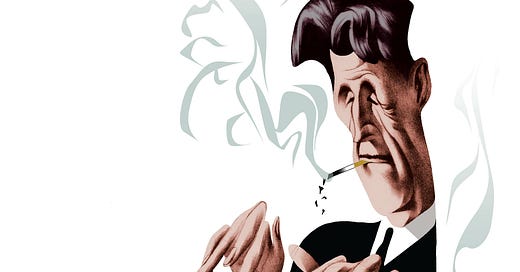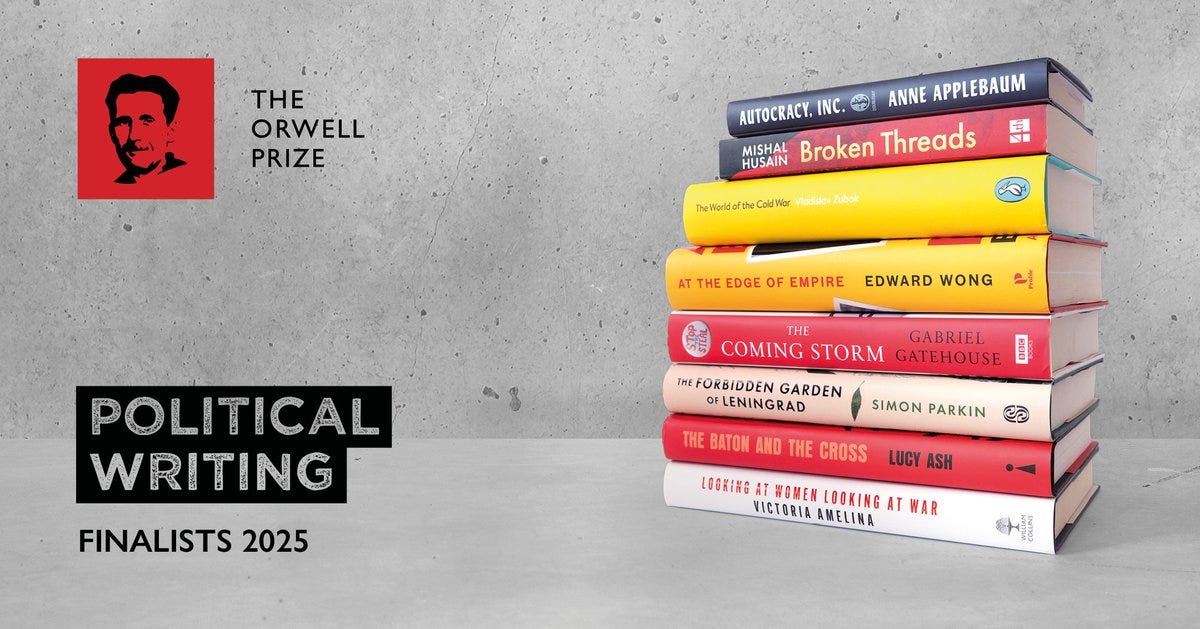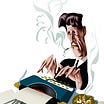"My starting point is always a feeling of partisanship, a sense of injustice."
An extract from Why I Write, first published Summer 1946
[…] When I was about sixteen I suddenly discovered the joy of mere words, i.e. the sounds and associations of words. The lines from Paradise Lost –
So hee with difficulty and labour hard Moved on: with difficult and labour hee,
which do not now seem to me so very wonderful, sent shivers down my backbone; and the spelling ‘hee’ for ‘he’ was an added pleasure. As for the need to describe things, I knew all about it already. So it is clear what kind of books I wanted to write, in so far as I could be said to want to write books at that time. I wanted to write enormous naturalistic novels with unhappy endings, full of detailed descriptions and arresting similes, and also full of purple passages in which words were used partly for the sake of their sound. And in fact my first completed novel, Burmese Days, which I wrote when I was thirty but projected much earlier, is rather that kind of book.
I give all this background information because I do not think one can assess a writer’s motives without knowing something of his early development. His subject-matter will be determined by the age he lives in – at least this is true in tumultuous, revolutionary ages like our own – but before he ever begins to write he will have acquired an emotional attitude from which he will never completely escape. It is his job, no doubt, to discipline his temperament and avoid getting stuck at some immature stage, or in some perverse mood: but if he escapes from his early influences altogether, he will have killed his impulse to write. Putting aside the need to earn a living, I think there are four great motives for writing, at any rate for writing prose. They exist in different degrees in every writer, and in any one writer the proportions will vary from time to time, according to the atmosphere in which he is living. They are:
(i) Sheer egoism. Desire to seem clever, to be talked about, to be remembered after death, to get your own back on grown-ups who snubbed you in childhood, etc., etc. It is humbug to pretend this is not a motive, and a strong one. Writers share this characteristic with scientists, artists, politicians, lawyers, soldiers, successful business men – in short, with the whole top crust of humanity. The great mass of human beings are not acutely selfish. After the age of about thirty they abandon individual ambition – in many cases, indeed, they almost abandon the sense of being individuals at all – and live chiefly for others, or are simply smothered under drudgery. But there is also the minority of gifted, willful people who are determined to live their own lives to the end, and writers belong in this class. Serious writers, I should say, are on the whole more vain and self-centered than journalists, though less interested in money.
(ii) Aesthetic enthusiasm. Perception of beauty in the external world, or, on the other hand, in words and their right arrangement. Pleasure in the impact of one sound on another, in the firmness of good prose or the rhythm of a good story. Desire to share an experience which one feels is valuable and ought not to be missed. The aesthetic motive is very feeble in a lot of writers, but even a pamphleteer or writer of textbooks will have pet words and phrases which appeal to him for non-utilitarian reasons; or he may feel strongly about typography, width of margins, etc. Above the level of a railway guide, no book is quite free from aesthetic considerations.
(iii) Historical impulse. Desire to see things as they are, to find out true facts and store them up for the use of posterity.
(iv) Political purpose – using the word ‘political’ in the widest possible sense. Desire to push the world in a certain direction, to alter other people’s idea of the kind of society that they should strive after. Once again, no book is genuinely free from political bias. The opinion that art should have nothing to do with politics is itself a political attitude.
It can be seen how these various impulses must war against one another, and how they must fluctuate from person to person and from time to time. By nature – taking your ‘nature’ to be the state you have attained when you are first adult – I am a person in whom the first three motives would outweigh the fourth. In a peaceful age I might have written ornate or merely descriptive books, and might have remained almost unaware of my political loyalties. As it is I have been forced into becoming a sort of pamphleteer. First I spent five years in an unsuitable profession (the Indian Imperial Police, in Burma), and then I underwent poverty and the sense of failure. This increased my natural hatred of authority and made me for the first time fully aware of the existence of the working classes, and the job in Burma had given me some understanding of the nature of imperialism: but these experiences were not enough to give me an accurate political orientation. Then came Hitler, the Spanish Civil War, etc. By the end of 1935 I had still failed to reach a firm decision. I remember a little poem that I wrote at that date, expressing my dilemma […]
The Spanish war and other events in 1936-37 turned the scale and thereafter I knew where I stood. Every line of serious work that I have written since 1936 has been written, directly or indirectly, against totalitarianism and for democratic socialism, as I understand it. It seems to me nonsense, in a period like our own, to think that one can avoid writing of such subjects. Everyone writes of them in one guise or another. It is simply a question of which side one takes and what approach one follows. And the more one is conscious of one’s political bias, the more chance one has of acting politically without sacrificing one’s aesthetic and intellectual integrity.
What I have most wanted to do throughout the past ten years is to make political writing into an art. My starting point is always a feeling of partisanship, a sense of injustice. When I sit down to write a book, I do not say to myself, ‘I am going to produce a work of art’. I write it because there is some lie that I want to expose, some fact to which I want to draw attention, and my initial concern is to get a hearing. But I could not do the work of writing a book, or even a long magazine article, if it were not also an aesthetic experience. Anyone who cares to examine my work will see that even when it is downright propaganda it contains much that a full-time politician would consider irrelevant. I am not able, and do not want, completely to abandon the world view that I acquired in childhood. So long as I remain alive and well I shall continue to feel strongly about prose style, to love the surface of the earth, and to take a pleasure in solid objects and scraps of useless information. It is no use trying to suppress that side of myself. The job is to reconcile my ingrained likes and dislikes with the essentially public, non-individual activities that this age forces on all of us.
Read the essay in full at www.orwellfoundation.com. All rights reserved - this extract remains under copyright in the US and may not be distributed or reused in any way without permission from the Orwell Estate.
Making sense of chaos: 12 Orwell Prize finalists on why they write
The Orwell Prize for Political Writing and the Orwell Prize for Political Fiction reward books that meet George Orwell’s own ambition ‘to make political writing into an art.' The winners will be announced on June 25th in London, and will each receive £3,000. In advance of the ceremony, the finalists were asked an essential question: Why do you write? Here’s what they said.







Worst is yet to come. Donald "The Beast" Trump is building a wall once again. Colossal tariff wall that is the beginning of the end for the system of down. At first the beast will pull the plug out of the global economy. The worst financial crisis of human history will pull a swarm of the banks underwater and the bank run begins. Then the beast will collapse a mountain of debt shattering the backbone of the monetary system causing a systemic risk to realize. Finally the beast will cast American citizens into a system slavery under the name of Ronald Wilson Reagan, just to "honor his legacy" count the number. After the destruction a new world order will be established in the US. And the Golden Age begins from the ruins of the world wide collapse. All of the system slaves will love it. No more cash - just digital transactions. No more traditional criminal activity. No more tax evasion. No more transactions without the "all seeing eye". Outcasts will hate the world without freedom, hope and privacy. To cover up the mess and distract the public by smoke and mirrors, the beast will engage in a war with Iran. Lies and deceit, corruption and decay, dancing on the graves will continue. Until; Black hole sun, won't you come, won't you come... I want to play a game. Time has come to opt out of the empire of filth. Live or die...